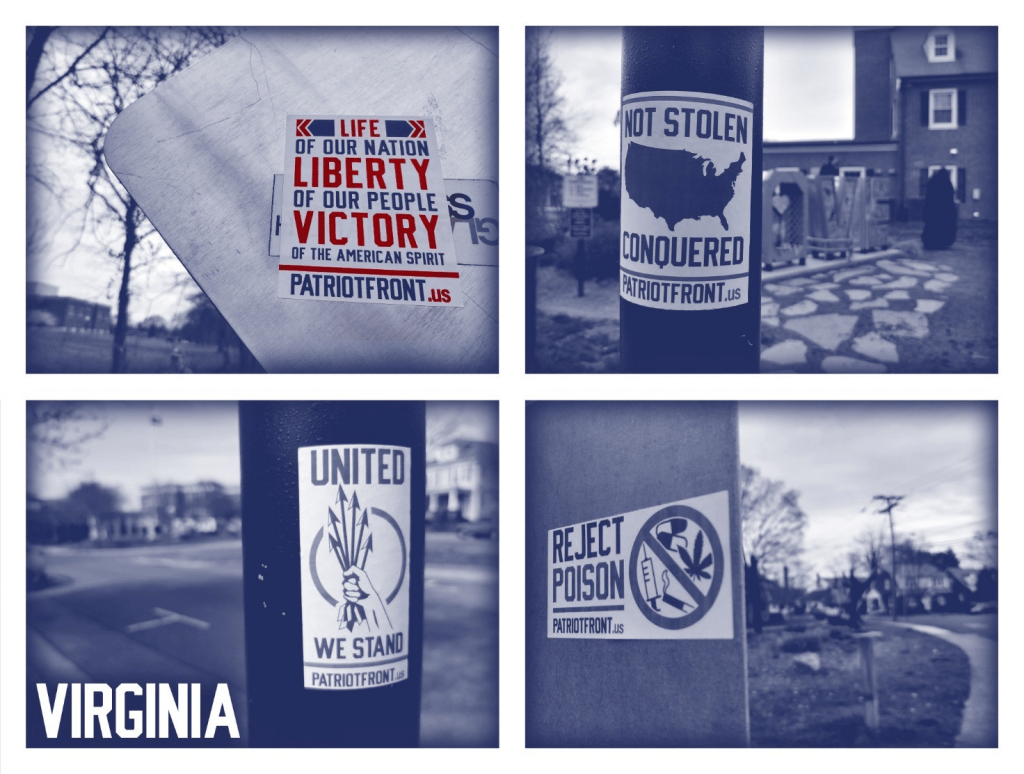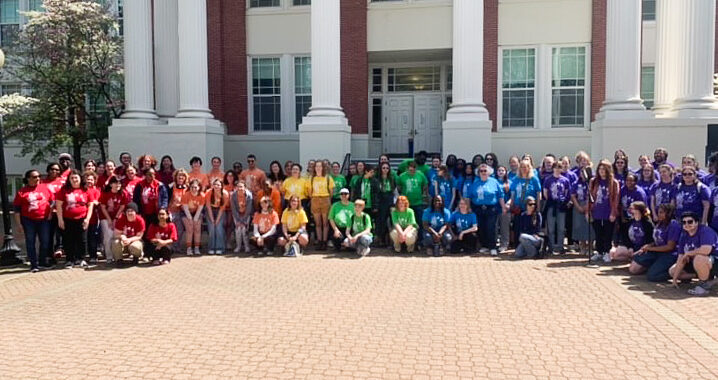Patriot Front uses the system to spread their message
7 min read
The white supremacist group, Patriot Front, has posted stickers on the UMW campus six times since 2018. | Patriot Front Gab page
by JESS KIRBY & JOSEPHINE JOHNSON
Staff Writers
In 2018, the UMW community was shocked when several stickers from Patriot Front, a white supremacist group, showed up on campus over the weekend of Feb. 17-18.
Since then, the school has seen the group plaster its message on campus five other times between Sep. 15, 2019 and March 30, 2020.
The school’s typical policy following each of these incidents is to remove the stickers and let the campus community know about them immediately through email, according to UMW Police Chief Michael Hall.
But the effects of this group are still present throughout the UMW community.
“I honestly felt like I might’ve made the wrong decision coming to UMW with those stickers appearing,” said freshman Tatiane Alycia Jones, a member of the NAACP.
According to Hall, when the police are informed of propaganda on the UMW campus, it is removed within 10-15 minutes. The sticker is then photographed, documented and reported to the UMW community. Because the group often posts more than one sticker at a time, the police use security footage to locate any additional stickers. But since the act of posting propaganda is not criminal, Hall can only remove and record it.
Because the First Amendment protects the posting of these stickers on campus, and other structural issues prevent police from arresting or fining Patriot Front members, there is no way to prosecute them.
Hall works with other members of the UMW administration, such as Marion Sanford, the director of Multicultural Affairs, and Sabrina Johnson, the vice president of Equity and Access and Chief Diversity Officer.
“When I receive notice that these types of posters have been placed on campus, I am in communication with members of the senior administration team, especially the vice president of Student Affairs and vice president for Equity and Access/CDO, our UMW Police Department, our staff and students to discuss the nature of these postings and how we want to address them,” said Sanford.
According to Hall, the school’s way of handling these messages might actually help promote the group.
“About a dozen people probably see that sticker before it’s removed, but when I send this message out that there’s stickers, I’m getting anywhere from five to 15,000 people, and that’s what this group wants. They feed on free advertisement and creating fear in a community,” said Hall.
Students express concern
Hall explained that several years ago, a white supremacist group posted propaganda between Lee and Mason Halls. The UMW police took it down but decided against reporting it to the community.
“The community members there felt that it was a target to them but it was nothing… that had suggested that, and they became very upset that the University had not sent anything out about it,” said Hall.
The police received backlash after that incident, and they decided from that point on to inform students about such messages.
“The community became very irritated and thought the University was trying to cover up something,” he said.
While Hall feels that sending email reports spreads the Patriot Front’s message, some students feel that the police should be doing more.
“When the stickers first arrived on campus… I felt campus police didn’t really handle the situation properly because they simply sent out an email and would take the stickers down. This is an open campus and I didn’t think campus police were monitoring security and safety well since there are very few cameras around and given that this has happened multiple times,” said Jones.
“I feel pretty scared about it, mostly because every time it happens we seem to just get an email about it and nothing else. It makes me wonder if the school is really prepared if some sort of white supremacist rally or even attack actually happened. I’m from Charlottesville so I remember when the one here happened a few years ago, so I just know how bad it can get,” said freshman Eli Keith, an English major.
Systems in place
The Clery Act is a federal law that requires police forces of federally-funded institutions to report crimes on and around their campuses. Since Patriot Front’s actions are not criminal, they cannot be designated as hate crimes, and police are not required to send out reports under the Clery Act. According to the U.S. Department of Justice, a hate crime must be both a violation of the law and motivated by hatred or bias against another. While the Patriot Front and other organizations’ acts of marches and flyering are motivated by hatred, they are not a violation of the law and are protected under the First Amendment.
Pete Simi, a sociology professor at Chapman University who has been studying extremist groups since 1996, suggests that white supremacist groups should be monitored in a way that does not infringe on other citizens’ freedom of speech.
“I strongly believe that the First Amendment’s only as good as it is if it protects the speech that we may generally find reprehensible. If we don’t protect that speech, then the First Amendment doesn’t amount to much. Because what I find reprehensible may be quite different than what you find reprehensible,” said Simi.
“It becomes very challenging and problematic because the action in and of itself is something the commonwealth attorney is not going to prosecute,” said Hall. “You have to use the same rationale that the person is putting up a yard sale sign on the light pole on College Ave. and William St. The act is the same, now the content is totally different and outright just hideous. But we can’t go by that, we have to go by the act. It’s not against the law to hate someone.”
Simi continued, “We do have limits on the First Amendment. That’s part of how the First Amendment’s been interpreted; it’s not complete, we don’t have complete freedom of speech. It’s perfectly constitutional for private companies to monitor and limit free speech… I think it’s a mistake that they’ve probably not been nearly aggressive enough.”
Coverage in the media
Journalists are trained to get both sides of a story, but Patriot Front states on their website that they “do not participate in interviews with journalists.” Reporters have still reached out without success.
“There is no more a proper way to speak to a journalist than there is to take a knife to the chest. They always win. You always lose,” said Patriot Front founder Thomas Rousseau on the group’s online Discord chat.
For journalists, it is ethically complicated to report on these groups because stories spread their message to larger audiences. However, Simi argues that it’s necessary to spread awareness of the actions of white supremacists.
“Any coverage plays into their hand, but ignoring them is even more dangerous,” said Simi.
Patriot Front strategy
Previously Vanguard America, Patriot Front emerged rebranded as a seperate group in 2017 after the “Unite the Right” rally in Charlottesville.
Patriot Front members are well-versed in laws regarding graffiti, trespassing and other crimes that could potentially get them in legal trouble. The group takes great care to ensure that all actions taken are law-abiding, making it impossible for them to be arrested.
In order to protect their anonymity, Patriot Front members wear masks, sunglasses and hats when appearing in public, and they use this anonymity to their advantage.
“I would say the biggest accomplishment of masking up is obfuscating our total numbers,” said a New York Patriot Front member under the pseudonym Samuel. “We can make them feel as if there are thousands of us when it’s only a few hundred, and we could be anyone and no one. Next time they are at the CVS and see a white kid with a neat haircut, it could be us. Fear of the unknown is the greatest fear of all.”
The most prominent outreach action that Patriot Front takes is through stickers and flyers. Simi says they do this because it’s cost efficient, easy and creates fear.
According to the Southern Poverty Law Center, in 2019 alone, Patriot Front posted 335 flyers on college campuses and more total flyers than any other extremist group that year.
Patriot Front also uses the placement of these stickers to send a message. This was seen on Sept. 15, 2019, when Patriot Front left a sticker saying “America first” on the sign outside UMW’s University Center where “James Farmer Multicultural Center” is written.
The discourse surrounding Patriot Front and other white supremacist groups is also controlled. According to Simi, it had long been known by extremist groups that terms like “neo-nazi” and “white supremacist” have a much more negative connotation than the terms they have coined for themselves. They thus label themselves as “alt-right” or “white nationalist” groups to make their message more sympathizable to outsiders. These terms have been integrated into public discourse about white supremacists, and members of these groups have expressed satisfaction at this, Simi said.
Why this is important
In order to address these underlying issues, Simi said the nation must be honest about its history. White supremacy has always been at America’s core over the course of history, even before the growth of extremist groups such as Patriot Front. He says that we need to get to the root causes of what’s creating this resurgence of white supremacy and better address what causes people to drift towards those ideals.
Under the current systems in place, extremist groups are allowed to rise by taking advantage of freedom of speech. According to Simi, closer monitoring of white supremacists is necessary to prevent their escalation to violence.
“While they may not be [committing a crime] at the moment, we have to project forward in terms of what’s possible in the future,” said Simi. “It’s really important to keep an eye on these kinds of groups and also realize that people involved in a group like the Patriot Front or Vanguard America will drift into other groups that are far more overtly committed to violence.”











